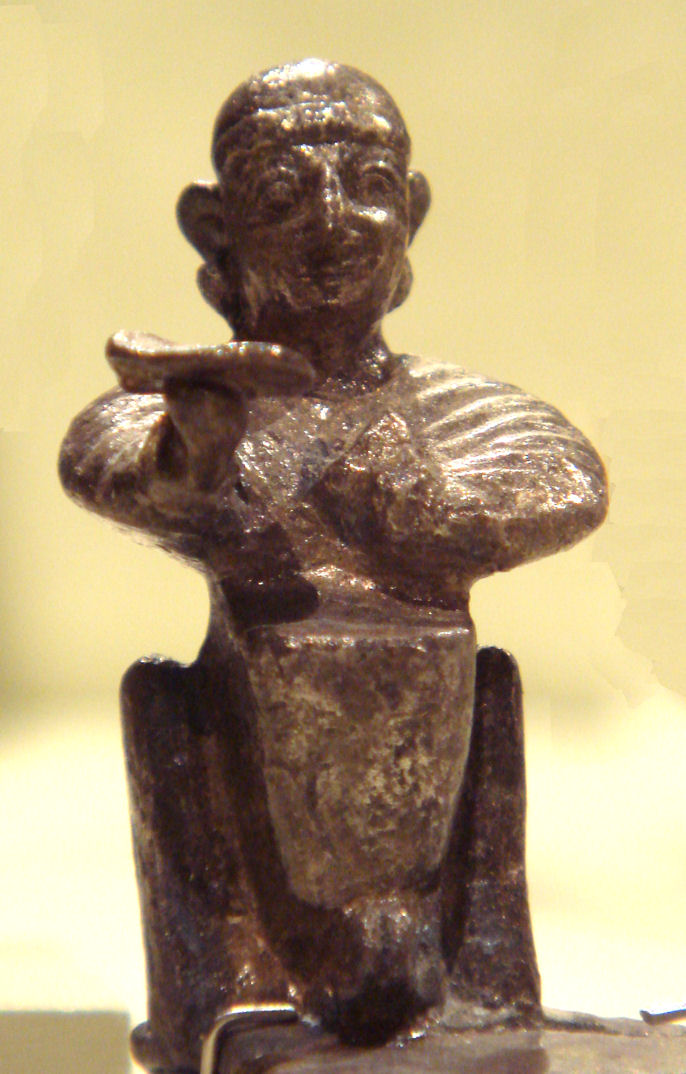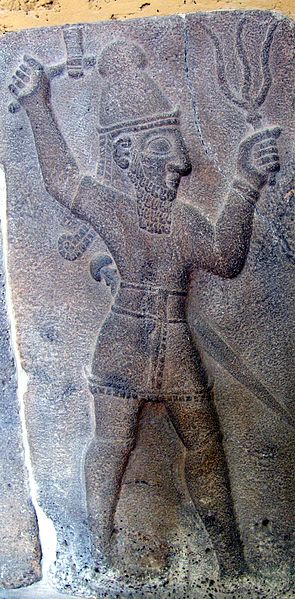|
ßĖ¬arap┼Īili
ßĖ¬arap┼Īili (or ßĖ¬arapsili, Harap┼Īili; "┼Ī" is pronounced as "s" in "sun") was a Hittite queen during the Old Kingdom of Hittites. Biography Family ßĖ¬arap┼Īili was probably a daughter of princess ßĖ¬a┼Ītayara and a man called Maratti. Her grandfather was king Hattusili I and her brother was king Mursili I (c. 1556 ŌĆō 1526 BC). Marriage She married a cupbearer named Hantili I. He conspired with Zidanta I and assassinated Mursili, thereafter taking the throne. The royal blood was preserved in the female line. She was a mother of one daughter who married Zidanta who became a king. Death ßĖ¬arap┼Īili died in Sugziya. In myth In one myth is mentioned " The Storm God of Queen Harapsili". This is mentioned in ''Hittite myths'', a book by Harry A. Hoffner. ... [...More Info...] [...Related Items...] OR: [Wikipedia] [Google] [Baidu] |
Hantili I
Hantili I was a king of the Hittites during the Hittite Old Kingdom. His reign lasted for 30 years, from c. 1590 to c. 1560 BC (middle chronology). Biography Rise to power According to the Telepinu Proclamation, Hantili was the royal cup-bearer to Mursili I, king of the Hittites. Hantili was married to ßĖ¬arap┼Īili, Mursili's sister. Around the year 1590 B.C., Hantili, with the help of Zidanta, his son-in-law, assassinated Mursili. Afterwards, Hantili succeeded him as king of the Hittites. Reign There are only a few scattered sources left that describe the reign of Hantili. During his reign, he continued the militaristic traditions of the kings before him. One of Hantili's main concerns was maintaining Hittite control in Syria. He journeyed to the city of Carchemish to conduct a military campaign, most likely against the Hurrians, longtime enemies of the Hittites. The success of this campaign is unknown. After the conclusion of this campaign, he made his return journey to Hat ... [...More Info...] [...Related Items...] OR: [Wikipedia] [Google] [Baidu] |
Mursili I
Mursili I (also known as Mursilis; sometimes transcribed as Murshili) was a king of the Hittites 1620-1590 BC, as per the middle chronology, the most accepted chronology in our times, (or alternatively c. 1556ŌĆō1526 BC, short chronology), and was likely a grandson of his predecessor, Hattusili I. His sister was ßĖ¬arap┼Īili and his wife was queen Kali. Mursili came to the throne as a minor. Having reached adulthood, he renewed Hattusili I's warfare in northern Syria. He conquered the kingdom of Yamhad and its capital, Aleppo )), is an adjective which means "white-colored mixed with black". , motto = , image_map = , mapsize = , map_caption = , image_map1 = ..., which had eluded Hattusili. He then led an unprecedented march of 2,000 km south into the heart of Mesopotamia, where in 1595 BC he sacked the city of Babylon. Mursili's motivation for attacking Babylon ... [...More Info...] [...Related Items...] OR: [Wikipedia] [Google] [Baidu] |
Hittites
The Hittites () were an Anatolian people who played an important role in establishing first a kingdom in Kussara (before 1750 BC), then the Kanesh or Nesha kingdom (c. 1750ŌĆō1650 BC), and next an empire centered on Hattusa in north-central Anatolia (around 1650 BC). This empire reached its height during the mid-14th century BC under ┼Āuppiluliuma I, when it encompassed an area that included most of Anatolia as well as parts of the northern Levant and Upper Mesopotamia. Between the 15th and 13th centuries BC, the Empire of HattusaŌĆöin modern times conventionally called the Hittite EmpireŌĆöcame into conflict with the New Kingdom of Egypt, the Middle Assyrian Empire and the empire of Mitanni for control of the Near East. The Middle Assyrian Empire eventually emerged as the dominant power and annexed much of the Hittite Empire, while the remainder was sacked by Phrygian newcomers to the region. After BC, during the Late Bronze Age collapse, the Hittites splintered in ... [...More Info...] [...Related Items...] OR: [Wikipedia] [Google] [Baidu] |
Hittite Mythology
Hittite mythology and Hittite religion were the religious beliefs and practices of the Hittites, who created an empire centered in what is now Turkey from . Most of the narratives embodying Hittite mythology are lost, and the elements that would give a balanced view of Hittite religion are lacking among the tablets recovered at the Hittite capital Hattusa and other Hittite sites. Thus, "there are no canonical scriptures, no theological disquisitions or discourses, no aids to private devotion". Some religious documents formed part of the corpus with which young scribes were trained, and have survived, most of them dating from the last several decades before the final burning of the sites. The scribes in the royal administration, some of whose archives survive, were a bureaucracy, organizing and maintaining royal responsibilities in areas that would be considered part of religion today: temple organization, cultic administration, reports of diviners, make up the main body of sur ... [...More Info...] [...Related Items...] OR: [Wikipedia] [Google] [Baidu] |
Margalit Finkelberg
Margalit Finkelberg (n├®e Karpyuk; born 1947) () is an Israeli historian and linguist. She is the professor emerita of Classics at Tel Aviv University. She became a member of the Israel Academy of Sciences and Humanities in 2005 and served as president of the Israel Society for the Promotion of Classical Studies from 2011 to 2016. Early life Finkelberg was born in Minsk on March 8, 1947 and immigrated to Israel in 1975. She received a Ph.D. from the Hebrew University of Jerusalem. Career Finkelberg began teaching in 1987 at the Hebrew University and from 1991 taught at Tel Aviv University. While there, she was the recipient of the 1991 Gildersleeve Prize from the Johns Hopkins University Press for the best article published in the American Journal of Philology. A few years later, while still teaching at Tel Aviv University, Finkelberg published ''The Birth of Literary Fiction in Ancient Greece'' in 1998. From 1999 to 2000, Finkelberg studied as a visiting fellow at All Souls Co ... [...More Info...] [...Related Items...] OR: [Wikipedia] [Google] [Baidu] |
Hattusili I
{{disambig ...
ßĖ¬attu┼Īili (''ßĖ¬attu┼Īili┼Ī'' in the inflected nominative case) was the regnal name of three Hittite kings: * ßĖ¬attu┼Īili I (Labarna II) *ßĖ¬attu┼Īili II *ßĖ¬attu┼Īili III It was also the name of two Neo-Hittite kings: * ßĖ¬attu┼Īili I (Labarna II) *ßĖ¬attu┼Īili II Hattusili II ( Hittite: "from Hattusa") may have been a king of the Hittite Empire (New kingdom) ca. the early 14th century BC (short chronology). His existence is disputed. In the treaty between Muwatalli II and Talmi-┼Āarruma of Aleppo, referen ... [...More Info...] [...Related Items...] OR: [Wikipedia] [Google] [Baidu] |
Zidanta I
Zidanta I was a king of the Hittites (Old Kingdom), ruling for 10 years, ca. 1560ŌĆō1550 BC (middle chronology) or 1496ŌĆō1486 BC (short chronology timeline). According to the Telepinu Proclamation, this king became a ruler by murder. Zidanta was married to the daughter of Hantili, brother-in-law to King Mursili I. Zidanta encouraged and helped Hantili to kill Mursili and seize the throne. At the end of HantiliŌĆÖs life, Zidanta killed Pi┼Īeni, the legitimate heir
Inheritance is the practice of receiving private property, titles, debts, entitlements, privileges, rights, and obligations upon the death of an individual. The rules of inheritance differ ...
[...More Info...] [...Related Items...] OR: [Wikipedia] [Google] [Baidu] |
Trevor Bryce
Trevor Robert Bryce (; born 1940) is an Australian Hittitologist specializing in ancient and classical Near-eastern history. He is semi-retired and lives in Brisbane. His book, ''The Kingdom of the Hittites'', is popular among English-speaking readers since the study of the Hittites has been dominated by German-language scholarship. A new improved and updated edition of this popular book, featuring 90 additional pages, was published in 2005. Bryce is a professor in the School of History, Philosophy, Religion, and Classics at The University of Queensland. Family He has two children and five grandchildren. Awards and professional elections * 1989 Fellow, Australian Academy of the Humanities * 2001 Centenary Medal * 2010 Doctor of Letters, University of Queensland Selected publications * * * ŌĆö Planned as a two-volume project, only Volume 1 has been published: * * * * * * * * * * See also *''Horizon The horizon is the apparent line that separates the surface of a celest ... [...More Info...] [...Related Items...] OR: [Wikipedia] [Google] [Baidu] |
Teshub
Teshub (also written Teshup, Te┼Ī┼Īup, or Te┼Īup; cuneiform ; hieroglyphic Luwian , read as ''Tarhunzas'';Annick Payne (2014), ''Hieroglyphic Luwian: An Introduction with Original Texts'', 3rd revised edition, Wiesbaden: Harrassowitz Verlag, p. 159. Ugaritic ÉÄÜÉÄśÉÄü, ''Tß╣«B'') was the Hurrian god of sky, thunder, and storms. Taru was the name of a similar Hattic storm god, whose mythology and worship as a primary deity continued and evolved through descendant Luwian and Hittite cultures. In these two, Taru was known as ''Tarhun / Tarhunt- / Tarhuwant- / Tarhunta'', names derived from the Anatolian root ''*tarh'' "to defeat, conquer". Taru/Tarhun/Tarhunt was ultimately assimilated into and identified with the Hurrian Teshub around the time of the religious reforms of Muwatalli II, ruler of the Hittite New Kingdom in the early 13th century BCE. [...More Info...] [...Related Items...] OR: [Wikipedia] [Google] [Baidu] |
Hans Gustav G├╝terbock
Hans Gustav G├╝terbock (May 27, 1908 ŌĆō March 29, 2000) was a German-American Hittitologist. Born and trained in Germany, his career was ended with the rise of the Nazis because of his Jewish heritage, and he was forced to resettle in Turkey. After the Second World War, he immigrated to the United States and spent the rest of his career at the University of Chicago. Early life Born in Berlin to a father of Jewish heritage who served as the secretary of the Deutsche Orient-Gesellschaft, G├╝terbock spent a year studying the Hittite language with Hans Ehelolf before moving on to Leipzig University. There he continued his Hittite studies and took up Assyriology, studying under Johannes Friedrich and Benno Landsberger and earning a doctorate. With private funding, G├╝terbock managed to spend three years in Bogazk├Čy as an epigrapher on a German team (while also employed by the Berlin Museum from 1933ŌĆō35), but Nazi racial laws compelled him to leave Germany and find employment ... [...More Info...] [...Related Items...] OR: [Wikipedia] [Google] [Baidu] |
Harry A
Harry may refer to: TV shows * ''Harry'' (American TV series), a 1987 American comedy series starring Alan Arkin * ''Harry'' (British TV series), a 1993 BBC drama that ran for two seasons * ''Harry'' (talk show), a 2016 American daytime talk show hosted by Harry Connick Jr. People and fictional characters *Harry (given name), a list of people and fictional characters with the given name *Harry (surname), a list of people with the surname *Dirty Harry (musician) (born 1982), British rock singer who has also used the stage name Harry *Harry Potter (character), the main protagonist in a Harry Potter fictional series by J. K. Rowling Other uses *Harry (derogatory term), derogatory term used in Norway * ''Harry'' (album), a 1969 album by Harry Nilsson *The tunnel used in the Stalag Luft III escape ("The Great Escape") of World War II * ''Harry'' (newspaper), an underground newspaper in Baltimore, Maryland See also *Harrying (laying waste), may refer to the following historical event ... [...More Info...] [...Related Items...] OR: [Wikipedia] [Google] [Baidu] |



_(cropped).jpg)